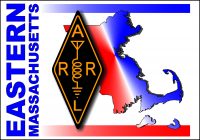Hello to all….
With the impact of Hurricane Katrina becoming one of the most horrific natural disaster’s in United States history, it is evident that the recovery effort will become one of potentially national significance lasting months and not weeks. Given that is the case, I will begin posting coordination messages similar to ones that I post for SKYWARN but detailing the disaster relief effort and what Eastern Massachusetts ARES is doing to be prepared to support the affected area if called upon by the appropriate leadership in Mississippi, Alabama, Louisiana and now South Texas given that thousands of people are now being sheltered in Texas.
Contact was made with Louisiana ARES Section Emergency Coordinator Gary Stratton-K5GLS this morning via email. At this time, they are in a “hold mode” concerning any outside support. They are awaiting word from Louisiana Homeland Security on when they can begin their deployments. Until that time, we have been asked to stand-by and await any further instructions. In that same note, I offered a “remote support” component from our ARES organization to support their operations. This support included net controls on HF, net controls utilizing VoIP and any relay stations to take traffic that is out of the affected area and destined for our region in the form of health and welfare traffic. At this time, they are so busy with emergency and priority traffic, that they are focused on that piece of their work at this time. Health and Welfare traffic has been halted into the region at this time. It is not yet known when Health & Welfare traffic will be facilitated from the affected area to the areas where loved ones are located across the United States.
As we watch the visions of despair, violence and in parallel the hope the disaster relief efforts provide, I’d like to remind all in the ARES community of the following:
1.) Please do not self-deploy to this area. It is a significantly dangerous and life-threatening situation. As much as we all want to help, the best thing to do right now is to wait until the situation stabilizes enough so that help can be properly provided. We all want to be heroes as we as Amateur Radio Operators have a knack for wanting to help our communities. The best help we can provide right now is to remain calm and patient. When the section’s affected is ready for our support, whether it be remote support or the support of a team to deploy to the area, they responsible leaders of the affected ARRL sections will call for us.
2.) Some Amateurs may have seen the database for Hams to sign up for message handling and deployment. Please do not sign up through that database. If you are interested in supporting the operation whether it be through remote message handling or deployment to the affected area, please let your DEC or myself know and we will be prepared to utilize you in the event of remote support or actual deployment.
3.) We must be careful not to overextend ourselves to support these ARRL sections affected by Hurricane Katrina. Hurricane Season continues and the peak is not till mid-September. It is still conceivable that we could be affected by a hurricane in our section and we will need to be ready to protect and support our communities. Also, let us not forget the continuous threat that Al Qaeda imposes on our homeland as well. There remains threats to our area so we need to balance supporting this horrific disaster with making sure our region is properly covered if a weather related, terrorist related or other such incident occurs in our region.
The President of the ARRL, Jim Haynie, W5JBP, sent out a powerful and excellent message to the Amateur Radio Community concerning being ready to help the region. A link to this article is provided below:
http://www.arrl.org/news/stories/2005/09/01/2/?nc=1
There are several frequencies active handling emergency and priority traffic. Those that would like to monitor the nets are welcome to do so but please do not interrupt traffic on the nets. Stand-by and monitor the nets and you will get a sense of what our Amateurs in the affected area are going through. The HF frequencies are listed below and were mentioned in the ARRL article on the web site:
West Gulf ARES Emergency Net:
7.285 MHz Days and 3.873 MHz nights LSB on
both frequencies.
SATERN Net: 14.265 USB
The next step from an Eastern Massachusetts ARES perspective will be to offer support to Mass. Bay Red Cross and Salvation Army to see if there is anything that can be done from a communications perspective working through our local relief agencies. As things develop, I will pass the information along to everyone.
Donations for people in the affected area can be made through the Red Cross and Salvation Army. Various work places may have also set up fundraising finds through their companies.
Please contact me or your ARES DEC with any questions or if you want to volunteer for any type of remote support or actual deployment if actual deployment becomes necessary in the coming weeks. Thanks to all of you for your continued support of ARES!
Respectfully Submitted,
Robert Macedo (KD1CY)
ARES SKYWARN Coordinator
Eastern Massachusetts ARES Section Emergency Coordinator
Pager #: (508) 354-3142
Home Phone #: (508) 994-1875 (After 6 PM)
Home/Data #: (508) 997-4503 (After 6 PM)
Work Phone #: (508) 346-2929
Email Address: rmacedo@rcn.com
http://users.rcn.com/rmacedo
1 1 1

